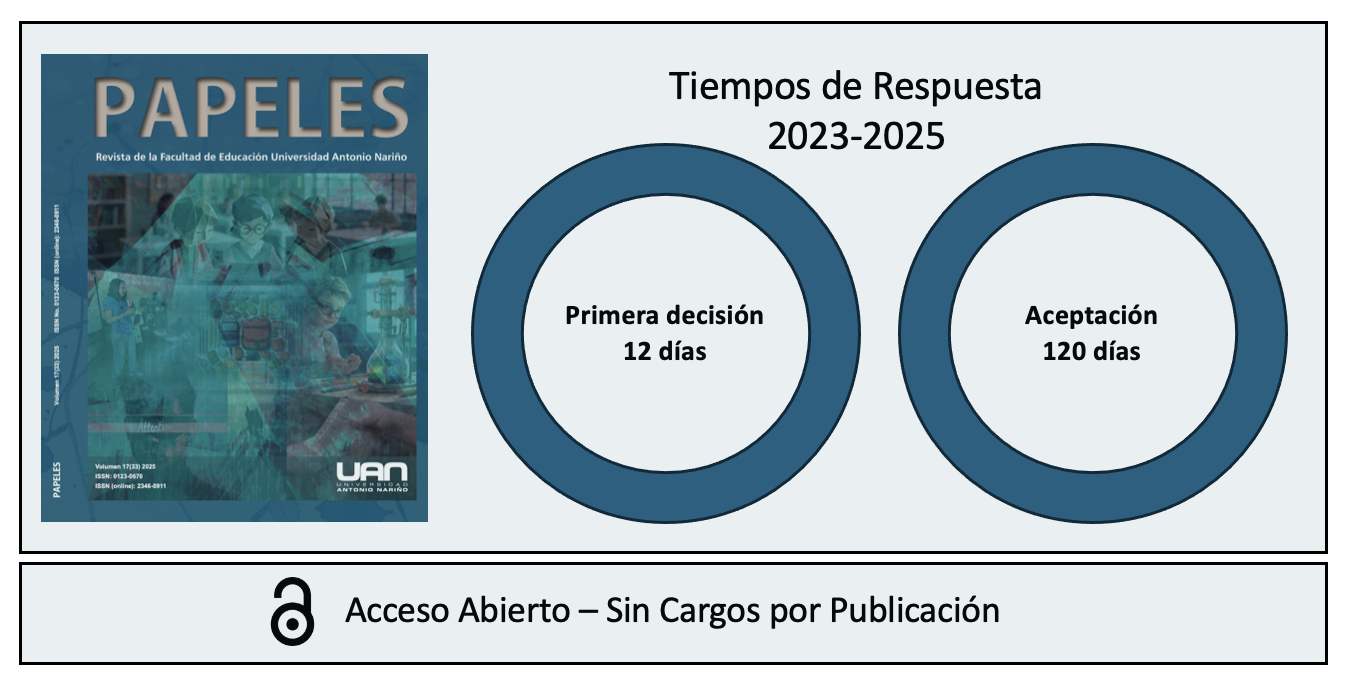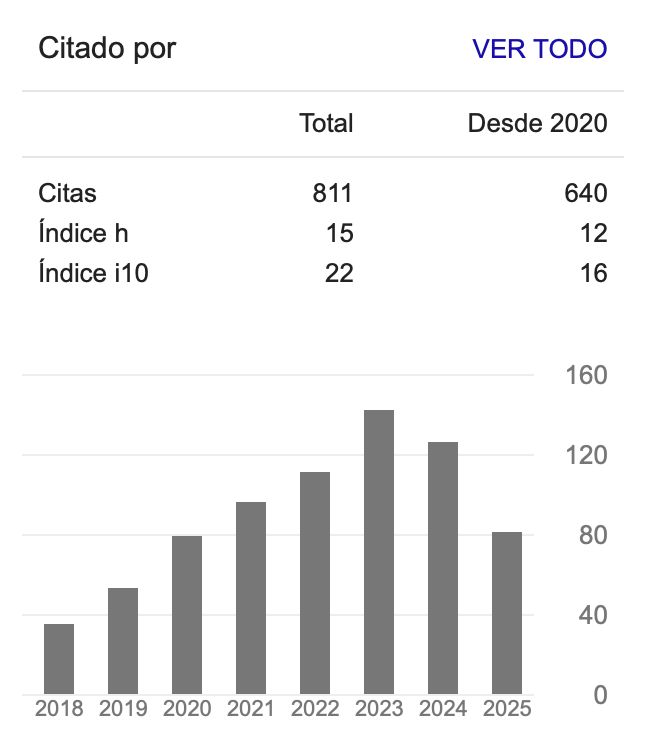La influencia de la teoría del valor en las revistas económicas ortodoxas y heterodoxas
DOI:
https://doi.org/10.54104/papeles.v11n22.603Palabras clave:
teoría del valor, ortodoxia, heterodoxia, teoría económicaResumen
La teoría del valor es un tema económico que ha sido investigado por los más grandes pensadores económicos a través de la historia, tanto por ortodoxos como heterodoxos. En este artículo se realiza una investigación descriptiva con base en revistas especializadas en temas económicos, de las corrientes ya mencionadas, acerca del estudio y el énfasis que tienen sobre el tema de la teoría del valor a través de sus diferentes volúmenes. Se seleccionaron distintas revistas. Con esta investigación se busca saber la frecuencia con la que se aborda la teoría del valor en sus diversos artículos y así comprobar la importancia y utilización de la teoría del valor en las revistas en la actualidad.
Descargas
Citas
(1) Akinci, U. Karahanogullari, Y. (2015). Convergence of monetary equivalent of labour times (MELTs) in two Marxian interpretations. Cambridge Journal of Economics, 39(3), 769–781.
(2) Ambrosi, G. (2018). Aristotle’s geometrical accounting. Cambridge Journal of Economics, 42(2), 543–576.
(3) Andrea Camila García Lozano. (2017, septiembre 27). Economía o Teoría Neoclásica. Recuperado 10 de diciembre de 2019, de ABCFinanzas.com website: https://www.abcfinanzas.com/principios-de-economia/economia-o-teoria-neoclasica.
(4) Andrews, D. (2015). Natural price and the long run: Alfred Marshall’s misreading of Adam Smith. Cambridge Journal of Economics, 39(1), 265–279.
(5) Baicker, K Mullainathan, S. Schwartzstein, J. (2015). Behavioral Hazard in Health Insurance. Quarterly Journal of Economics, 130(4), 1623–1667.
(6) Barrot, J. Sauvagnat, J. (2015). Input Specificity and the Propagation of Idiosyncratic Shocks in Production Networks. Quarterly Journal of Economics, 131(3), 1543–1592.
(7) Cipolla, F. (2017). The Mechanism of Relative Surplus Value. Review of Radical Political Economics, 50(1), 116-135.
(8) Clark, D. Martorell, P. (2014). The Signaling Value of a High School Diploma. Journal of Political Economy, 122(2), 282-318.
(9) Cuyvers, L. (2014). Was Henri de Man an Early Post-Keynesian Neo-Marxist?. Review of Radical Political Economics, 47(1), 90-105.
(10) De Gregorio, J. (2012, agosto). Macroeconomía -Teoría y políticas-. Recuperado 10 de diciembre de 2019, de http://www.degregorio.cl/pdf/Macroeconomia.pdf.
(11) Díaz, E. Velasco, F. (2015). The Transformation of Values into Prices of Production in Marx’s Scheme of Expanded Reproduction. Review of Radical Political Economics, 48(3), 394-416.
(12) Economía Financiera. (s. f.). Recuperado 11 de diciembre de 2019, de http://www.depfe.unam.mx/posgrado-economia/economia-financiera/
(13) Esteban.V, Paz. M, Orbe. S, Regúlez. M, Zarraga. A, Zubia. M. (Octubre de 2009). Econometría básica Aplicada con Grelt. Universidad del País Vasco. recuperado de https://addi.ehu.es/bitstream/handle/10810/12496/08-09est.pdf?sequence=1&isAllowed=y.
(14) Fernández, V. (2014). Global Value Chains in Global Political Networks: Tool for Development or Neoliberal Device?. Review of Radical Political Economics, 47(2), 209-230.
(15) Freeman, A. (2014). Schumpeter’s theory of self-restoration: a casualty of Samuelson’s Whig historiography of science. Cambridge Journal of Economics, 38(3), 663–679.
(16) Gowrisankaran, G. Reynolds, S. Samano, M. (2016). Intermittency and the Value of Renewable Energy. Journal of Political Economy, 124(4), 1187-1234.
(17) Hörner, J. Skrzypacz, A. (2016). Selling Information. Journal of Political Economy, 124(6), 1515-1562.
(18) Jehiel, P. Lamy, L. (2018). A Mechanism Design Approach to the Tiebout Hypothesis. Journal of Political Economy, 126(2), 735-760.
(19) Jones, P. (2017). Turnover time and the organic composition of capital. Cambridge Journal of Economics, 41(1), 81–103.
(20) Kaur, S. Kremer, M. Mullainathan, S. (2015). Self-Control at Work. Journal of Political Economy, 123(6), 1227-1277.
(21) Lim, C. Yurukoglu, A. (2018). Dynamic Natural Monopoly Regulation: Time Inconsistency, Moral Hazard, and Political Environments. Journal of Political Economy, 126(1), 263-312.
(22) Manganelli, M., & Gabriel, A. (2010, diciembre). TEORÍA DEL VALOR TRABAJO: LOS ENFOQUES DE SMITH Y RICARDO. Recuperado 10 de diciembre de 2019, de https://ucema.edu.ar/u/jms/cursos_grado_y_posgrado/historia_del_pensamiento_economico/monografias_anteriores/2010_gabriel_manganelli.pdf.
(23) Milios, John (2003). "Marx's Value Theory Revisited. A 'Value-form' Approach." (PDF). Proceedings of the Seventh International Conference in Economics (PDF). https://plato.stanford.edu/archives/spr2015/entries/value-intrinsic-extrinsic/.
(24) Montes, G. (2015). A Capital Invariant Solution to the Marxian Transformation Problem. Review of Radical Political Economics, 49(1), 114-124.
(25) Nielsen, T. Alves, R. (2016). The autonomisation of abstract wealth: new insights on the labour theory of value. Cambridge Journal of Economics, 40(4), 1185–1201.
(26) Nitzan, J. Bichler,S. Capital as Power: A Study of Order and Creorder, Routledge, 2009, p. 228.
(27) Paulani, L. (2014). Money in contemporary capitalism and the autonomisation of capitalist forms in Marx’s theory. Cambridge Journal of Economics, 38(4), 779–795.
(28) Ponticelli, P. Alencar, L. (2015). Court Enforcement, Bank Loans, and Firm Investment: Evidence from a Bankruptcy Reform in Brazil. Quarterly Journal of Economics, 131(3), 1365–1413.
(29) Rieu, D. Lee, K. Ahn, H. The Determination of the Monetary Expression of Concrete Labor Time under the Inconvertible Credit Money System. Review of Radical Political Economics, 46(2), 190-198.
(30) Román, A. J. B. (1999). Comercio exterior: TEORIA Y PRACTICA. EDITUM.
(31) Rosell, O. (2017). Wages, competition and the surplus of labour: a classical contribution to explaining profit. Cambridge Journal of Economics, 41(1), 63–80.
(32) Saros, D. (2014). Interlocking Turnover Continua and the Structure of Capital. Review of Radical Political Economics, 46(3), 380-401.
(33) Salvatore, D. (s. f.). Microeconomía. Recuperado 10 de diciembre de 2019, de Google Docs website: https://drive.google.com/a/unal.edu.co/file/d/1zLJolUVWRNpnjpSYhtWqUSflmP7sI_6N/view?usp=drive_open&usp=embed_facebook.
(34) Schefold, B. (2016). Profits equal surplus value on average and the significance of this result for the Marxian theory of accumulation: Being a new contribution to Engels’ Prize Essay Competition, based on random matrices and on manuscripts recently published in the MEGA for the first time. Cambridge Journal of Economics, 40(1), 165–199.
(35) Schroeder, S. (2018). The Influence of the Review of Radical Political Economics: Insights on Selected Key Articles. Review of Radical Political Economics, 50(3), 549-575.
(36) Squicciarini, M. Voigtländer, N.(2015). Human Capital and Industrialization: Evidence from the Age of Enlightenment. Quarterly Journal of Economics, 130(4), 1825–1883.
(37) Smithin, J. (2016). Some puzzles about money, finance and the monetary circuit. Cambridge Journal of Economics, 40(5), 1259–1274.
(38) Starosta, G. Fitzsimons, A. (2017). Rethinking the Determination of the Value of Labor Power. Review of Radical Political Economics, 50(1), 99-115.
(39) Tsaliki, P. Paraskevopoulou, C. Tsoulfidis, L. Unequal exchange and absolute cost advantage: evidence from the trade between Greece and Germany. Cambridge Journal of Economics, 42(4), 1043–1086.
(40) Vlachou, A. (2014). The European Union’s missions Trading System. Cambridge Journal of Economics, 38(1), 127–152.
(41) Wiens. (s. f.). UBC Student—Prose—The Political Economy of British Columbia’s Rainforests. Recuperado 11 de diciembre de 2019, de http://www.egwald.ca/ubcstudent/prose/politicaleconomy.php.
(42) Zarembka, P. (2014). Materialized Composition of Capital and its Stability in the United States: Findings Stimulated by Paitaridis and Tsoulfidis (2012). Review of Radical Political Economics, 47(1), 106-111.
(43) Zimmerman, M. J. (2002). Intrinsic vs. Extrinsic Value. Recuperado de https://plato.stanford.edu/archives/spr2015/entries/value-intrinsic-extrinsic/.
Descargas
Publicado
-
Resumen458
-
PDF235
Cómo citar
Número
Sección
Licencia

Esta obra está bajo una licencia internacional Creative Commons Atribución-NoComercial-CompartirIgual 4.0.







 Portal de Ciencia Abierta
Portal de Ciencia Abierta